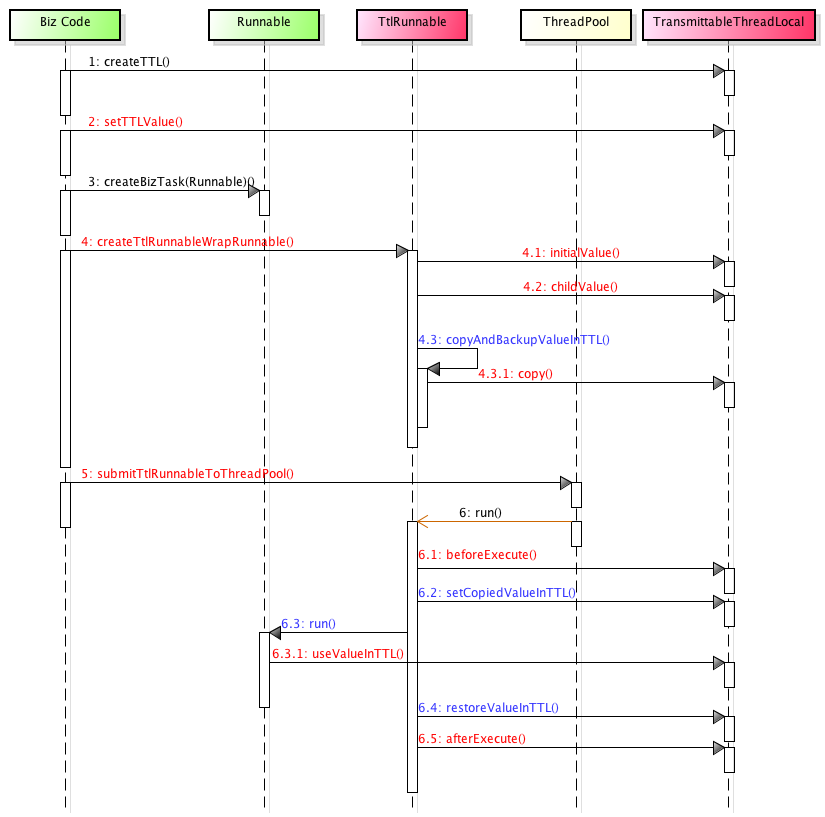本文主要是介绍【多线程开发 2】从代码到实战TransmittableThreadLocal,希望对大家解决编程问题提供一定的参考价值,需要的开发者们随着小编来一起学习吧!
【多线程开发 2】从代码到实战TransmittableThreadLocal
本文将从以下几个点讲解TransmittableThreadLocal(为了方便写以下简称ttl):
-
前身
-
是什么?
-
可以用来做什么?
-
源码原理
-
实战
前身
ThreadLocal
要了解ttl就要先了解Java自带的类ThreadLocal,threadlocal是作为当前线程中属性ThreadLocalMap集合中的某一个Entry的key值Entry(threadlocl,value),虽然不同的线程之间threadlocal这个key值是一样,但是不同的线程所拥有的ThreadLocalMap是独一无二的,,用于存储一些线程不安全的公共变量,通过“给每一个线程一个线程不安全的变量的拷贝”,来达到线程安全的目的,就不会出现变量多个线程之间共享的问题。
ThreadLocal 变量通常被private static修饰。当一个线程结束时,它所使用的所有 ThreadLocal 相对的实例副本都可被回收。
InheritableThreadLocal
使用ThreadLocal可以解决线程安全问题,但是也有一定的局限性,比如无法在父子线程之间传递信息,因此InheritableThreadLocal就是JDK为了解决这个问题而创建的
TTL是什么?可以做什么?
在现在开发的情况下肯定是需要复用线程的,如果说InheritableThreadLocal在生成子进程的时候会做信息传递,但是在使用线程池或者其他需要复用线程的地方,由于会不产生新的Thread,而是直接使用空闲的已建成的Thread,所以的话InheritableThreadLocal有时候会不能用,此时可以通过使用TTL解决对应问题。

读取线程间传递的ThreadLocal 值比较麻烦,ThreadLocal 和 InheritableThreadLocal 都没有开放内部的 ThreadLocalMap,不能直接读取。所以TTL继承了InheritableThreadLocal,在每次调用 ThreadLocal的 set/get/remove 等接口的时候,为 Thread 记录到底绑定了哪些需要发生线程间传递的 ThreadLocal 对象。
在创建runnable的时候,TTL会通过holder遍历全部的TTLRunnable快照,看出上下文中有哪些线程上的信息需要进行复制。
TTL的GitHub项目地址:https://github.com/alibaba/transmittable-thread-local,感兴趣的话可以查看一下源码,后续有时间的话我会出一篇详细解析TTL源码的项目地址。
实战
其中需要使用拦截器辅助实现,需要读者依据相应技术架构自行实现
使用TTL实现MDC日志在多系统之间的信息传输
public class CustomMdcAdapters implements MDCAdapter {private static final int WRITE_OPERATION = 1;private static final int MAP_COPY_OPERATION = 2;private static CustomMdcAdapters mtcMDCAdapter;static {mtcMDCAdapter = new CustomMdcAdapters();MDC.mdcAdapter = mtcMDCAdapter;}private final ThreadLocal<Map<String, String>> copyOnInheritThreadLocal = new TransmittableThreadLocal<>();private final ThreadLocal<Integer> lastOperation = new ThreadLocal<>();public static MDCAdapter getInstance() {return mtcMDCAdapter;}private static boolean wasLastOpReadOrNull(Integer lastOp) {return lastOp == null || lastOp == MAP_COPY_OPERATION;}private Integer getAndSetLastOperation(int op) {Integer lastOp = lastOperation.get();lastOperation.set(op);return lastOp;}private Map<String, String> duplicateAndInsertNewMap(Map<String, String> oldMap) {Map<String, String> newMap = Collections.synchronizedMap(new HashMap<>(16));if (oldMap != null) {// we don't want the parent thread modifying oldMap while we are// iterating over itsynchronized (oldMap) {newMap.putAll(oldMap);}}copyOnInheritThreadLocal.set(newMap);return newMap;}@Overridepublic void put(String key, String val) {if (key == null) {throw new IllegalArgumentException("key cannot be null");}Map<String, String> oldMap = copyOnInheritThreadLocal.get();Integer lastOp = getAndSetLastOperation(WRITE_OPERATION);if (wasLastOpReadOrNull(lastOp) || oldMap == null) {Map<String, String> newMap = duplicateAndInsertNewMap(oldMap);newMap.put(key, val);} else {oldMap.put(key, val);}}@Overridepublic void remove(String key) {if (key == null) {return;}Map<String, String> oldMap = copyOnInheritThreadLocal.get();if (oldMap == null) {return;}Integer lastOp = getAndSetLastOperation(WRITE_OPERATION);if (wasLastOpReadOrNull(lastOp)) {Map<String, String> newMap = duplicateAndInsertNewMap(oldMap);newMap.remove(key);} else {oldMap.remove(key);}}@Overridepublic void clear() {lastOperation.set(WRITE_OPERATION);copyOnInheritThreadLocal.remove();}@Overridepublic String get(String key) {final Map<String, String> map = copyOnInheritThreadLocal.get();if ((map != null) && (key != null)) {return map.get(key);} else {return null;}}public Map<String, String> getPropertyMap() {lastOperation.set(MAP_COPY_OPERATION);return copyOnInheritThreadLocal.get();}public Set<String> getKeys() {Map<String, String> map = getPropertyMap();if (map != null) {return map.keySet();} else {return null;}}@Overridepublic Map<String, String> getCopyOfContextMap() {Map<String, String> hashMap = copyOnInheritThreadLocal.get();if (hashMap == null) {return null;} else {return new HashMap<>(hashMap);}}@Overridepublic void setContextMap(Map<String, String> contextMap) {lastOperation.set(WRITE_OPERATION);Map<String, String> newMap = Collections.synchronizedMap(new HashMap<>(16));newMap.putAll(contextMap);copyOnInheritThreadLocal.set(newMap);}
}
使用TTL帮助实现web服务中的用户信息传输
public final class ContextsUtils {private ContextsUtils() {}private static final ThreadLocal<Map<String, String>> THREAD_LOCAL = new TransmittableThreadLocal<>();public static void putAll(Map<String, String> map) {map.forEach(ContextsUtils::set);}public static void set(String key, Object value) {Map<String, String> map = getLocalMap();map.put(key, value == null ? StrPool.EMPTY : value.toString());}public static <T> T get(String key, Class<T> type) {Map<String, String> map = getLocalMap();return Convert.convert(type, map.get(key));}public static <T> T get(String key, Class<T> type, Object def) {Map<String, String> map = getLocalMap();return Convert.convert(type, map.getOrDefault(key, String.valueOf(def == null ? StrPool.EMPTY : def)));}public static Map<String, String> getLocalMap() {Map<String, String> map = THREAD_LOCAL.get();if (map == null) {map = new ConcurrentHashMap<>(10);THREAD_LOCAL.set(map);}return map;}/*** 其他get/set各种信息需要读者依据业务自行实现。。。*/}
这篇关于【多线程开发 2】从代码到实战TransmittableThreadLocal的文章就介绍到这儿,希望我们推荐的文章对编程师们有所帮助!






